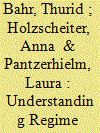|
|
|
Sort Order |
|
|
|
Items / Page
|
|
|
|
|
|
|
| Srl | Item |
| 1 |
ID:
132355


|
|
|
|
|
| Publication |
2014.
|
| Summary/Abstract |
This paper discusses contemporary engagement with the theory and analysis of discourse in international relations. It argues that discourse understood as "meaning in use" has emerged as one of the core concepts in constructivist scholarship, being of tremendous theoretical and analytical value. The paper identifies two distinct types of discourse analysis around which most contributions in this field converge: micro-interactional approaches that emphasize the communicative, pragmatic aspects of discourse and macro-structural approaches focusing on discourse as structures of signification. What unites these studies is their interest in the diffuse power relationships that characterize social interaction in international politics and the productive effects of power that the term "discourse" serves to underline. Through a combination of these two different strands of discourse research, with two different conceptualizations of power (deliberative and productive), the paper develops a taxonomy of discourse approaches that reflects four distinct variants of discourse research. These variants are illustrated by means of an in-depth discussion of recent innovative studies. In conclusion, the paper points to a number of limitations in the present conceptualization of power through discourse as well as in terms of the uneasy combination of positivist epistemology and constructivist ontology in much empirical discourse research. Discussing the overlap between discourse and practice scholarship, the paper sketches future directions for research in this field.
|
|
|
|
|
|
|
|
|
|
|
|
|
|
|
|
| 2 |
ID:
187253


|
|
|
|
|
| Summary/Abstract |
This article approaches the field of global health governance from the vantage point of shared discourses and norms on the good governance of governance amongst multiple international organisations (IOs). Conceptually, we introduce metagovernance norms as constitutive, reflexive beliefs concerned with institutional order and IO interactions in a given governance field. We argue that such norms are entangled with causal beliefs and problem perceptions that form part of contingent, contested repertoires of knowledge. Moreover, we illustrate how IO ‘expert’ groups form an authoritative subject position from which truth claims about governance are advanced. Empirically, we trace metagovernance norms in discourse(s) amongst eight health IOs since the 1970s. We show how metagovernance norms have been constructed around competing beliefs about governance ‘effectiveness’ and problem perceptions concerned with different forms of ‘complexity’. Our research demonstrates that discourses on institutional order in global health are shaped by metagovernance norms drawing on historically-specific knowledge repertoires.
|
|
|
|
|
|
|
|
|
|
|
|
|
|
|
|
| 3 |
ID:
173403


|
|
|
|
|
| Summary/Abstract |
In recent years, scholarship on international organisations (IO) has devoted increasing attention to the relations in which IOs are embedded. In this article, we argue that the rationalist-institutionalist core of this scholarship has been marked by agentic, repressive understandings of power and we propose an alternative approach to power as productive in and of relations among IOs. To study productive power in IO relations, we develop a theoretical framework centred on the concept of ‘metagovernance norms’ as perceptions about the proper ‘governance of governance’ that are shared among IOs in a governance field. Drawing on discourse theory, we contend that metagovernance norms unfold productive power effects, as dominant notions of how to govern well and effectively (i) fix meanings, excluding alternative understandings and (ii) are inscribed into practices and institutions, hence reshaping inter-organisational relations over time. To illustrate our framework, we trace metagovernance norms in discourses among health IOs since the 1990s. We find a historical transformation from beliefs in the virtues of partnerships, pluralisation, and innovation, towards discursive articulations that emphasise harmonisation, order, and alignment. Moreover, we expose the productive power of metagovernance norms by showing how they were enacted through practices and institutions in the global health field.
|
|
|
|
|
|
|
|
|
|
|
|
|
|
|
|
| 4 |
ID:
144054


|
|
|
|
|
| Summary/Abstract |
This article analyses global civil society advocacy in the field of child labour through the lens of theories on political representation in global governance. The article is sympathetic to newer theories on political representation which, fundamentally, understand representation as a dialectic of performative practices between representatives and their real or imagined constituencies. However, the article argues that the contemporary literature on political representation turns a blind eye on two aspects that are central to understanding this dialectic of representation in the child labour case: first, representation as power and second, the contested nature of citizenship. The article thus proposes an approach to political representation that allows highlighting the power-dimension inherent to the interrelation between formal and performative aspects of representation, that is, between civil society actors’ power to represent and their power over representation. Using such an approach, the article presents empirical insights on CSO representation in global policymaking on child labour – a field in which conflicts over legitimate representation, citizenship, and grassroots participation continue to be exceptionally fierce.
|
|
|
|
|
|
|
|
|
|
|
|
|
|
|
|
| 5 |
ID:
184644


|
|
|
|
|
| Summary/Abstract |
How do regime complexes as social orders affect relations among international organizations (IO s)? This article explores this question by studying the longitudinal development of interorganizational practices and the social meanings attached to these practices that constitute a regime complex. Adopting a practice lens, our analysis redirects scholarly attention from rationalist accounts of strategic interactions between IO s to the study of patterned “doings” among actors in regime complexes. The mixed-methods analysis of interorganizational practices between eight IO s in the global health regime complex shows that cooperation among IO s is not primarily the outcome of rational responses to problems of collective action. Rather, IO s engage in similar types of practices because they want to be considered “good” IO s that follow a repertoire of habitual and appropriate practices. In turn, interorganizational practices create social meanings that constrain IO s. The approach put forward in this paper demonstrates the ordering effect of practices on the global health regime complex.
|
|
|
|
|
|
|
|
|
|
|
|
|
|
|
|
|
|
|
|
|